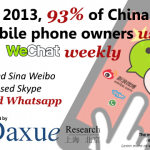Digital Trends for the Plastic Surgery Industry in China
To know more about the Plastic Surgery Industry in China, contact us at dx@daxueconsulting.com
How Plastic Surgery is Going Digital in China?
According to a recent report from HSBC, China’s social media and obsessions with selfies have created a vanity fest and a large market for cosmetic surgery, with sales to Chinese consumers poised to reach 800 billion yuan ($122 billion) by 2019, up from 400 billion Yuan in 2014. China, in absolute numbers, is set to become the cosmetic industry’s third-largest market in the world, behind the U.S. and Brazil, according to China’s Association of Plastics and Aesthetics. However, the country is still far behind globally with respect to plastic surgeries per capita. As young Chinese consumers use their mobiles and apps to communicate with each other, gather news and information, the app market is flooding with plastic surgery apps, transforming the industry.
Plastic Surgery Industry in China: Developing Apps
Giving Chinese women a taste of plastic surgery
 The hot plastic surgery trend in China and Korea in recent years consists of “jaw line thinning” – where women try to reduce their “bigger faces” to resemble those of Western women. This “shaving” entails cutting into the bone and trimming off some of the bone, the end result being a more sculpted face and a more triangular chin that resembles the supposed “pixie” look of Western faces.
The hot plastic surgery trend in China and Korea in recent years consists of “jaw line thinning” – where women try to reduce their “bigger faces” to resemble those of Western women. This “shaving” entails cutting into the bone and trimming off some of the bone, the end result being a more sculpted face and a more triangular chin that resembles the supposed “pixie” look of Western faces.
However, many Chinese women just want a taste of plastic surgery. Meitu Xiu Xiu has an offering that meets this need, offering women a digital “touch up”. It plays on Chinese women’s fantasies of achieving a more refined – or more “Western” – aesthetic that consists of having a streamlined facial contour, whiter skin, and bigger eyes. Meity Xiu Xiu is the leading app of its kind in the Chinese market and has been phenomenally successful. According to its official website, Meitu has more than 500 million users and is installed on over 900 million mobile devices worldwide. Usage of such apps is transforming the aesthetic standards of women in China, putting more pressure on Chinese women to use plastic surgery to augment their beauty. Indeed, the growth of subscribers to such apps is accompanied by a surge in plastic surgery.
Linking Chinese women to nearest plastic surgery centers
The physical beauty app market is valued to be $3 billion. Recently, Tencent invested in a Chinese nip-tuck app in the $50 million round. The app is developed by SoYoung Technology (Beijing) Co., and the company will use the funds to develop cloud technology as the app integrates loan financing to help younger people get surgery. The company is valued at nearly 3 billion yuan ($462 million).
The app has 10 million downloads so far and is trying to enlist 200 clinics and thousands of plastic surgeons to its platform. It is easier to connect plastic surgery consumers to plastic surgery centers than consumers of traditional medical procedures, such as heart operations, as the plastic surgery industry faces fewer policy restrictions. This contributes to the surge of plastic surgery apps linking Chinese women to plastic surgery centers. “In areas like cosmetic surgery, e-commerce platforms can make pricing and competition more transparent”, says CEO Jin Xing. “SoYoung is positioned to become the first successful company based on an online health care business model.”
However, according to an expert in the field, aesthetics treatments in China is occupying this gray area between the real health and the Chinese consumer health care. This may lead to increased scrutiny by the government of the plastic surgery industry and the apps related to it. ZhengBa, another app that connects Chinese women to plastic surgery, cooperates with the official academic association for cosmetic surgery, which makes consumers more likely to trust its offering.
Recent Trends
The plastic surgery industry used to be dominated by Korean firms offering surgeries to vacationing Chinese tourists. This group was an elite group, who could not only afford the surgery but also the visa. More recently, however, a plethora of Chinese plastic surgery outlets have opened throughout the country. This is likely to make plastic surgery cheaper and more accessible to a wider range of Chinese women. Hence in the Chinese plastic surgery market, linking such consumers with reliable and quality plastic surgery centers become increasingly important.
In conclusion, the Chinese plastic surgery industry is projected to grow immensely over the next years, and due to shifts within the industry, plastic surgery has become available to a broader range of Chinese consumers. This development presents an excellent opportunity for plastic surgery apps that link such consumers to plastic surgery centers, as well as for apps that give consumers a taste of beauty.
Case Study: Pharmaceutical Industry
Daxue Consulting was contacted by a pharmaceutical firm specializing in anti-aging cosmetics for women in order to build the firm’s brand identity in China. The client had been using social media to build their brand image. In order to get a deep understanding of the perceptions of their customers, they wanted to differentiate their brand from the competition and define a clear communication strategy for their social media platforms in China.
Daxue Consulting performed eight focus groups in Shanghai and Beijing to collect qualitative information on the customer’s behavior on social media platforms. The results collected by the study helped the client to adapt its social media listening strategy to the Chinese market. Although social media listening is not an easy tool for a brand to fully utilize, it can be very effective when generating market insights on consumer perceptions of the brand, the brand category, and brand’s message.
Follow us on Twitter to see our latest post:
Chinese Middle Class Opened a Multibillion-Dollar Market for #healthcare #technology #China https://t.co/FAp8wwEAaj pic.twitter.com/zn16mzjrGS
— Daxue Consulting (@DaxueConsulting) June 27, 2016















